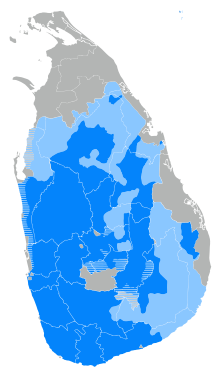Sinhala language
Sinhala or Sinhalese,[2] earlier referred to as Singhalese, is the language of the Sinhalese. They are largest ethnic group of Sri Lanka. It belongs to the Indo-Aryan language family.
| Sinhala | |
|---|---|
| Sinhalese | |
| සිංහල Siṁhala | |
 | |
| Pronunciation | IPA: [ˈsiŋɦələ] |
| Native to | Sri Lanka and Singapore |
| Region | Srilankan islands |
| Ethnicity | Sinhalese people |
Native speakers | 17.00 million (2012)[1] 3 million L2 speakers (2012)[1] |
Early form | |
| Dialects |
|
| Official status | |
Official language in | |
| Language codes | |
| ISO 639-1 | si |
| ISO 639-2 | sin |
| ISO 639-3 | sin |
| Glottolog | sinh1246 |
| Linguasphere | 59-ABB-a |
 Sinhala-speaking province of Sri Lanka: dark blue is spoken by the majority; light blue is spoken along with other languages. | |
Sinhala has two varieties/forms - Spoken and Written, the former being the most popular form. Spoken Sinhala is easier to learn and use because it is so much relaxed in grammatical formality and rigidity. [3]
Sinhala is spoken by about 19 million people in Sri Lanka, about 16 million of them are native speakers. It is one of the constitutionally-recognised official languages of Sri Lanka, with Tamil.[4] Sinhala has its own writing system (see Sinhala script) which is an offspring of the Indian Brahmi script.
The oldest Sinhala inscriptions were written in the 3rd and 2nd centuries BC; the oldest existing literary works date from the 9th century AD.
The closest relative of Sinhala is Dhivehi, the language of the Maldives, .
The word order of Sinhala language is SOV (subject-object-verb) just like Japanese, Korean and many other languages in Asia. It would be easy for people from that particular language style to learn Sinhala with a little time and practice.
Ex 1 :
I home go
Mama gedara yanawa.
Ex 2 :
beautiful dress
Lassana anduma
Morphologically, the words are built with the stem followed by a particle. The particle can vary so that it adds more grammatical change into the word connecting it to the whole sentence.
pusa yanawa -
kitten is going.
pusath yanawa -
kitten is also going.
ballata denawa -
giving (it) to the dog
ballatath denawa
giving it to the dog as well
ballatama denawa
giving it to the dog itself.
If you really take a good look at these sentences, you may easily find the stem of the words: pusa, pusath; ballata, ballathath, ballatama.
pusa- is the stem of the subjectival phrase. (kitten)
Pusa + th - as well
pusa + ta - to kitty
pusa + ta + th - to kitty as well
pusa + ta + ma - to kitty itself ^^